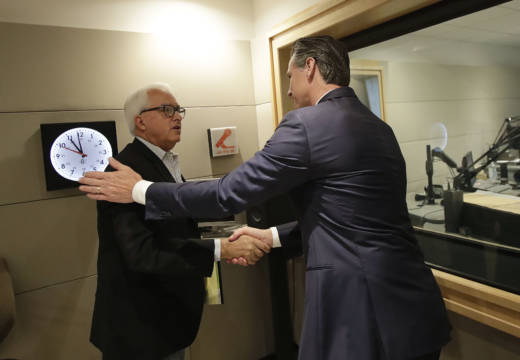Cox wasn't the only critic. On Tuesday morning, a newsletter from David Crane, president of the group Govern for California, which advocates for charter schools and public employee pension reform, declared the hour-long discussion a failure.
"To our disappointment there wasn't a single question about the poor performance of the two major enterprises run by the State of California: K-12 and Medi-Cal," he wrote.
To a certain extent, I agree. And I moderated the debate.
We did cover housing, immigration, sanctuary laws, guns, climate change, Brett Kavanaugh's confirmation to the Supreme Court and more. And to be clear, I was prepared with questions about unfunded pension liabilities, health care, water and education.
But with all the competing considerations for questions and topics, there wasn't time to get to everything I wanted to discuss in the one hour allotted for the conversation.
Which got me thinking: Why not develop a state version of the Commission on Presidential Debates, a nonprofit, nonpartisan entity created in 1987 to plan and execute debates between the top presidential and vice-presidential candidates? Each presidential year since 1988, they've produced the prime-time broadcasts after determining the time, place and formats of the debates.
The Republican and Democratic parties and their nominees only have a limited role in negotiating the details, and they're not obligated to participate. But they do.
The Commission on Presidential Debates was created to put certainty into the debate schedules of the presidential nominees.
"They operated under the theory that if you build it they will come. Lo and behold most candidates have bought into that proposition," said Mike McCurry, former press secretary to President Bill Clinton and former co-chair of the debate commission.
McCurry said the key was having a prestigious, bipartisan commission that commanded respect of the two major parties.
"I can easily imagine that in a state like California you could have a blue ribbon group that comes together and says, 'We’re going to create a structure for this.' There's absolutely no reason that couldn’t happen," McCurry said.
He added that having buy-in from major media promising to air the debate live creates a political cost to candidates who decline to debate.
"That might be the critical element here," McCurry said. He also suggested holding the debates at universities or colleges where students and faculty can be involved.
In Arizona, the Citizens Clean Elections Commission sponsors statewide and legislative debates, but only if there's at least one candidate who abides by "clean" campaign finance rules in which they get public funding in exchange for agreeing not to take special-interest or high-dollar private contributions.
"New York City requires any candidate who accepts public funding for citywide office to participate in debates," said Kati Phillips, a spokeswoman for California Common Cause. They've spent three years trying to develop a similar model in Los Angeles.
"We are one vote away from requiring all city council and citywide candidates to participate in a debate or town hall to qualify for public financing," Phillips said. "Previously the law had a loophole — candidates just had to agree to a debate, not actually show up!"
Currently, the terms of gubernatorial debates and whether or not they happen are largely dictated by the front-runner. Conventional wisdom says debates are more likely to help the challenger or the candidate who is behind in the polls.
It's true there were plenty of debates before the June primary, including a televised debate in San Jose with the six top-polling candidates for governor. But that's not the same as a one-on-one matchup, where it's harder to skate under the radar.
"The most important thing about debates is that it gets people on the record making commitments before they’re elected," said Kim Alexander, president of the California Voter Foundation. "It isn’t so much that every registered voter will watch the debate, but rather you have a public record of what they say they'll do if they win."
While debates might not increase voter turnout, at least they would help publicize the fact that an election is happening and who's running, Alexander said.
Conventional wisdom is that incumbents don't debate unless they feel they have to. The last time U.S. Sen. Dianne Feinstein debated was 2000, when her opponent was moderate Republican Tom Campbell. Since then she has declined any face-to-face matchups, and while her campaign is promising something before the election, it's not likely to be a high-profile or a high-stakes event.
It's not at all clear that debates help voters make up their minds on who to support, but they can increase enthusiasm for the candidates they already prefer.
Some political observers doubt you could really compel or shame candidates into participating in debate if they think it's not in their best political interest.
But there's only one way to find out.
